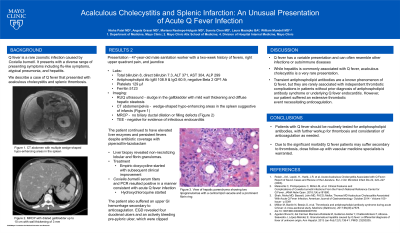Tuesday Poster Session
Category: Biliary/Pancreas
P2968 - Acalculous Cholecystitis and Splenic Infarction: An Unusual Presentation of Acute Q Fever Infection
Tuesday, October 24, 2023
10:30 AM - 4:00 PM PT
Location: Exhibit Hall

Has Audio

Nisha Patel, MD
Mayo Clinic Hospital
Rochester, MN
Presenting Author(s)
Nisha Patel, MD, Angela Grassi, MD, William Mundell, MD
Mayo Clinic Hospital, Rochester, MN
Introduction: Q fever is a rare zoonotic infection caused by Coxiella burnetii with a diverse range of presenting clinical manifestations, including flu-like symptoms, atypical pneumonia, and hepatitis. We describe an atypical presentation of Q fever that presented with acalculous cholecystitis and splenic thrombosis in the setting of positive antiphospholipid antibodies.
Case Description/Methods: A 47-year-old male sanitation worker presented with two weeks of fevers, right upper quadrant abdominal pain, and jaundice. Labs revealed elevated liver enzymes in a mixed pattern and thrombocytopenia. Imaging revealed sludge in the gallbladder with mild wall thickening, diffuse hepatic steatosis, and multiple splenic infarcts. MRCP showed no biliary ductal dilation or filling defects and TEE was negative for evidence of infectious endocarditis. The patient continued to have elevated liver enzymes and persistent fevers despite treatment with piperacillin-tazobactam. Additional workup was significant for elevated antiphospholipid antibodies. Liver biopsy revealed non-necrotizing lobular and fibrin granulomas. Due to suspicion for Q fever infection, the patient was empirically started on doxycycline with subsequent clinical improvement. Coxiella burnetii serum titers and PCR resulted positive in a manner consistent with acute Q fever infection, and the patient was started on hydroxychloroquine as well. His hospitalization was also complicated by upper GI hemorrhage secondary to anticoagulation in the setting of positive antiphospholipid antibodies. EGD was performed, revealing four duodenal ulcers and an actively bleeding pre-pyloric ulcer, which was clipped.
Discussion: This case highlights the importance of considering a broad differential diagnosis, including Q fever, in patients with signs of hepatobiliary disease. Q fever has a variable presentation and can often resemble other infections or autoimmune diseases. While hepatitis is commonly associated with Q fever, acalculous cholecystitis is a very rare presentation. In addition, although transient antiphospholipid antibodies are a known phenomenon of Q fever, they are rarely associated with independent thrombotic complications in patients without prior diagnosis of antiphospholipid antibody syndrome or evidence of underlying Q fever endocarditis. However, our patient suffered an extensive thrombotic event necessitating anticoagulation and then complicated by GI bleed.
Disclosures:
Nisha Patel, MD, Angela Grassi, MD, William Mundell, MD. P2968 - Acalculous Cholecystitis and Splenic Infarction: An Unusual Presentation of Acute Q Fever Infection, ACG 2023 Annual Scientific Meeting Abstracts. Vancouver, BC, Canada: American College of Gastroenterology.
Mayo Clinic Hospital, Rochester, MN
Introduction: Q fever is a rare zoonotic infection caused by Coxiella burnetii with a diverse range of presenting clinical manifestations, including flu-like symptoms, atypical pneumonia, and hepatitis. We describe an atypical presentation of Q fever that presented with acalculous cholecystitis and splenic thrombosis in the setting of positive antiphospholipid antibodies.
Case Description/Methods: A 47-year-old male sanitation worker presented with two weeks of fevers, right upper quadrant abdominal pain, and jaundice. Labs revealed elevated liver enzymes in a mixed pattern and thrombocytopenia. Imaging revealed sludge in the gallbladder with mild wall thickening, diffuse hepatic steatosis, and multiple splenic infarcts. MRCP showed no biliary ductal dilation or filling defects and TEE was negative for evidence of infectious endocarditis. The patient continued to have elevated liver enzymes and persistent fevers despite treatment with piperacillin-tazobactam. Additional workup was significant for elevated antiphospholipid antibodies. Liver biopsy revealed non-necrotizing lobular and fibrin granulomas. Due to suspicion for Q fever infection, the patient was empirically started on doxycycline with subsequent clinical improvement. Coxiella burnetii serum titers and PCR resulted positive in a manner consistent with acute Q fever infection, and the patient was started on hydroxychloroquine as well. His hospitalization was also complicated by upper GI hemorrhage secondary to anticoagulation in the setting of positive antiphospholipid antibodies. EGD was performed, revealing four duodenal ulcers and an actively bleeding pre-pyloric ulcer, which was clipped.
Discussion: This case highlights the importance of considering a broad differential diagnosis, including Q fever, in patients with signs of hepatobiliary disease. Q fever has a variable presentation and can often resemble other infections or autoimmune diseases. While hepatitis is commonly associated with Q fever, acalculous cholecystitis is a very rare presentation. In addition, although transient antiphospholipid antibodies are a known phenomenon of Q fever, they are rarely associated with independent thrombotic complications in patients without prior diagnosis of antiphospholipid antibody syndrome or evidence of underlying Q fever endocarditis. However, our patient suffered an extensive thrombotic event necessitating anticoagulation and then complicated by GI bleed.
Disclosures:
Nisha Patel indicated no relevant financial relationships.
Angela Grassi indicated no relevant financial relationships.
William Mundell indicated no relevant financial relationships.
Nisha Patel, MD, Angela Grassi, MD, William Mundell, MD. P2968 - Acalculous Cholecystitis and Splenic Infarction: An Unusual Presentation of Acute Q Fever Infection, ACG 2023 Annual Scientific Meeting Abstracts. Vancouver, BC, Canada: American College of Gastroenterology.
